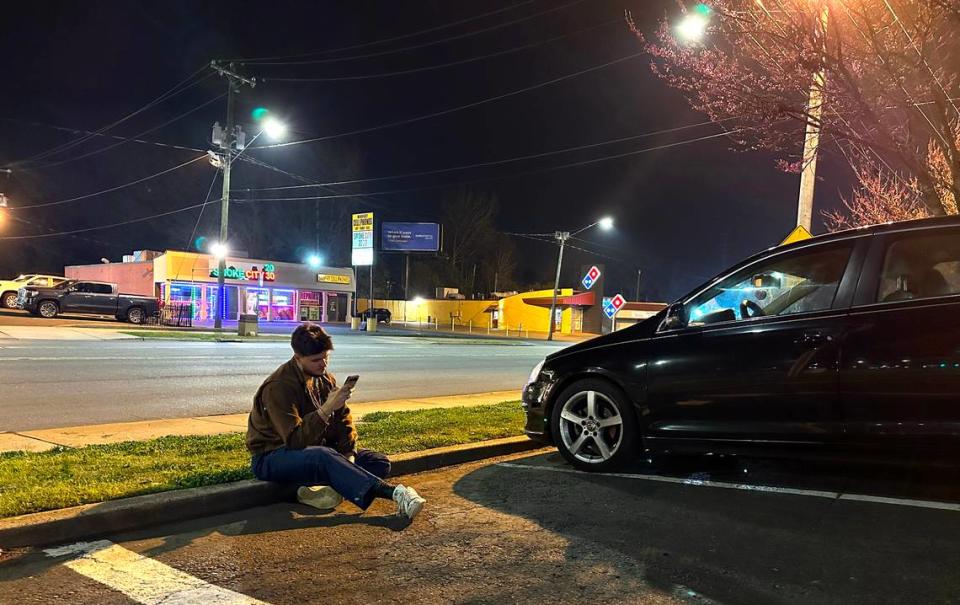911 pickup times in Charlotte improve. But some callers are still left waiting.

One evening in January, James Holtzclaw called 911 after being involved in a minor car accident.
“I was put on hold for four minutes before I even got to speak with anyone,” said Holtzclaw. “It was 6 p.m. when the accident happened. By the time I called a second time since no officer came, it was a bit past 8 p.m.,” said Holtzclaw. He was placed on hold again, but this time for over six minutes. He was told the dispatcher was still trying to find an available officer.
“I was getting frustrated… I was out all day and was wanting to go home,” said Holtzclaw. “I couldn’t imagine what it would have been like if someone was seriously injured.”
People in Charlotte expect to receive immediate help in an emergency when calling 911, but some are met with long wait times. In a life threatening situation, a few minutes can make all the difference.
In October 2022, dispatchers answered 60% of calls in 10 seconds or less, according to the Charlotte Mecklenburg Police Department. The industry standard set by the National Emergency Number Association is to answer 90% of calls within 10 seconds.
CMPD has hired nine more dispatchers since November 2022, and it is now closer to meeting the industry standard. Dispatchers now answer 85% of calls in 10 seconds or less, according to CMPD.
While CMPD is answering 911 calls faster, there is still room for improvement, according to Daniel Redford, CMPD officer and president of the Charlotte Fraternal Order of Police. In some cases, people are still being placed on hold for minutes before speaking to an operator.
“The first thing I heard was we are having higher than average call volumes right now, please wait,” said Holtzclaw.
Each year, CMPD dispatchers answer nearly one million calls, and that number continues to rise. Staff shortages among dispatchers and officers as well as an increase in call volume are just a few of the many challenges CMPD faces.
An average of about 84 people moved to Charlotte each day from 2020 to 2021, according to the United States Census Bureau. Now in 2023, an average of more than 100 people move to Charlotte each day. The increase in population has brought a rise in crime and car accidents, said Redford.
Mecklenburg County now has more than 1.1 million residents, according to the U.S. Census Bureau.
CMPD is responsible for everything within the city limits, as well as some unincorporated parts of Mecklenburg County.
Staff shortages following the COVID-19 pandemic have been a challenge. Since the beginning of the pandemic, hiring new recruits has been difficult, said Redford.
CMPD is allocated 126 telecommunicators and is allowed to hire 20 more during the busiest times of the year. CMPD did not respond when asked how many of those positions are vacant.
Retaining dispatchers is also difficult, partly because of the low pay and high stress of the job, according to Redford. For 911 operators in North Carolina, the mean salary is $35,190 or $16.92 an hour, according to 911dispatcherEDU.org. The salary also doesn’t compensate for the extreme emotional exhaustion that comes along with being a dispatcher, said Redford.
Operators for 911 are vulnerable to post-traumatic stress disorder, anxiety and depression, according to Presbyterian Psychological Services, which provides local counseling to first responders.
“You’re hearing people call in at their worst times,” Redford said. “Unless it becomes a news story, the dispatcher may not know the outcome of the call… there’s no follow through with that.”
Hiring more dispatchers won’t solve the problem entirely, as there is still a staffing shortage among CMPD officers available to respond to emergencies. Charlotte is short roughly 300 officers, Redford estimates.
“The dispatcher is able to collect the information and enter it into a dispatching system, but then it’s going to be held in a pending queue because we don’t have enough officers,” said Redford. He said the department needs several hundred more officers to do the job properly.
“It’s frustrating,” Redford said. “There’s people that can die, and I’m sure there’s people that have died because they’ve called and there’s been a delay in the response.”
CMPD says it has improved service by increasing pay and bonuses, authorizing overtime pay and assigning some officers to help field calls. It has also set up automated options for callers to select whether they need police, fire or MEDIC -- a step designed to reduce the number of calls coming into CMPD.
Redford acknowledges that CMPD works hard on recruiting, but questions whether enough has been done to retain officers and dispatchers. More should be done to help dispatchers deal with the stresses of the job, he said.
“We’re not asking ourselves, ‘Why are these people leaving?’ ” said Redford.
Sam Carnes of Apex, North Carolina, is a student in the James L. Knight School of Communication at Queens University of Charlotte, which provides the news service in support of community news.

 Yahoo Movies
Yahoo Movies 